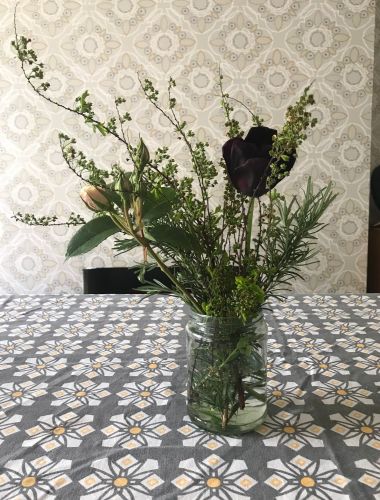Front Door Closed, Cupboard Doors Open - Tips For A Resourceful Lockdown
Posted on
My lockdown journey began with a slightly manic clearing out kitchen cupboards phase, as the survival instincts kicked in and I started to wonder if we could eat the rice from our door stops and forage for food from the local park (and a small part of me wanted to try :-D)! As our front doors closed so it seemed our cupboard doors opened. In searching for things to do to break up the Groundhog Day monotony, a clearout began on an unprecedented (that word again) scale!
In this blog post I share with you tips and resources that will help you make the most of your archeological cupboard discoveries, many of which have been borrowed from other creative souls.
1. Use Up Kitchen Cupboard Leftovers
A delve into the kitchen cupboards will no doubt reveal an interesting array of foodstuffs, bought in a moment of culinary ambition, used once, and since forgotten! I discovered a variety of grains and a big slab of what was once marzipan (I think). The latter was donated to the wormery!
Now that we have more time at home to cook from scratch, and are making fewer visits to the shops, this is the time to embrace the leftovers.
-
For simple, low budget recipe inspiration watch Jack Monroe @bootstrapcook on her new show, Daily Kitchen BBC1 (available on iplayer). Having had her own website and cookbook for years, the beeb hooked her up to do this show while we are in lockdown ‘from her battered old shed, using stuff from skips’. I hope they keep her, as I love her cooking ethos which saves money, and gives ideas on how to use all sorts of leftovers from polenta to tinned peaches (she is responsible for a spike in sales in the latter). She is also very humorous! https://cookingonabootstrap.com/
-
Make your own breadcrumbs from leftover stale bread. Use a blender or for less faff simply put the leftover bread in a bag and rub between your fingers or bash with a rolling pin, like you would with biscuits to make crumbs. You can then use and freeze as needed. Breadcrumbs are useful for making a wide range of foods like meatballs and goujons (recreate Maccy D’s chicken nuggets?), and are delicious cooked in the oven or fried with oil for a crunchy topping!
-
Make soups and casseroles from leftovers. The ultimate one-pot, no need to think, meals whereby you simply open your fridge and cupboard and throw in what you have! To add more flavour, use seasoning, spices and any chilli sauce you may have lying around. Salty foods like anchovies and humous will do the seasoning for you. Add stock cubes or bouillion if you have it, or make your own which leads me to my next point…
-
Make your own stock. An amazing way to reduce food waste and you don’t necessarily need meat leftovers. Scraps like broccoli stems, onion ends, carrot peelings and tops, all the bits you would normally throw in your food bin, can be used to make stock. Put your scraps into boiling water and leave to simmer for a few hours. Then strain out the bits and use/ freeze the leftover broth. If you don’t have enough from one meal, freeze the scraps and add to them over time until you have enough to make the broth.
-
If you are still left with food waste after all of your resourcefulness, then consider creating a compost heap and/or wormery in the garden. There are plenty of online tutorials on how to make your own, or you can order online. I was lucky enough to be given a wormery, and am just starting to harvest the rich worm-poo compost for my garden. https://www.edenproject.com/learn/for-everyone/how-to-make-a-compost-heap-10-top-tips
2. Harvest Free Paper From Old School Text Books
At the end of each school year the children bring home their exercise books, which at secondary level equates to a lotta books! I can never bring myself to throw them away, not for reasons of nostalgia but for the fact that they are still full of unused pages. As such we have ended up with numerous stashes around the house.
A shortage of paper whilst on lockdown gave me the nudge I needed to do something with those books, and I spent a couple of hours removing all of those empty pages. I recommend a sharp blade, and some good music, for the job - a great mindless activity! We now have excellent supplies of lined, squared and plain paper...for free!
3. Give Pencil Sharpeners A New Lease Of Life
How many pencil sharpeners do you have in the house? How many of them actually sharpen?! We have too many to count, yet when one of us (actually only ever me) tries to sharpen a pencil we never seem to be able to find one that works properly. This is because pencil sharpener blades do become blunt with time. You can give them a new lease of life by ordering new stainless steel blades online cheaply, and fitting them. They are cheap to buy, and all you need is a small screwdriver to remove the old and replace with the new. Easy!
https://www.amazon.co.uk/Spare-blades-metal-pencil-sharpeners/dp/B00AWAUHKQ
4. Make and grow your own using shed discoveries!
A shed clearout can uncover all sorts of wonders; from old planks of wood and containers, to seeds and paint. This paraphernalia might normally end up in a skip, but can in fact form the beginnings of many a project like those below;
-
Make your own raised bed or wooden planter using old pallets, decking, fence panels and any old wood you can find. Our neighbours did a fantastic job using leftover wood (pic below). OK so you do need some DIY nowse, but there are plenty of tutorials on line like this one:
https://www.gardenersworld.com/how-to/diy/how-to-build-a-raised-vegetable-bed/
-
Use old containers to grow your own; you can pimp them up with a lick of paint if needs-be! Look in recycling too - decent sized glass jars can make ideal pots for seedlings, as they act like mini hot houses.
-
Make your own nature habitats like a mini-pond (read my how-to guide), hedgehog hotel and bug hotel. Easy projects that take very little skill and are ideal for involving the children. The RSPB sites has some great how-to guides.
-
Utilise every bit of space you have to grow something that will either feed you, feed insects or bring you great joy (ideally all three :-)). It appears that the nation has gone gardening crazy, so much so that people are struggling to find places to buy from! The following UK online shops still have stock (at the time of writing);
https://www.rocketgardens.co.uk/products/veg-plants/spring-veg-plants/ - All the herbs and vegetables you could ever need!
https://www.bluebellcottage.co.uk/ - Plastic Free Packaging
http://www.rosybee.com/plants - Bee friendly plants, just received my order and the plants are very healthy and lush looking
https://www.naturescape.co.uk/
https://plantsavers.co.uk/ - New company distributing plants from Garden Centres. Very good value packages including compost, but the contents of the package is a surprise!
5. Make Your Own Flower Arrangements
You can make the most beautiful flower arrangements for your home using almost anything from your garden and outdoors, including stems, branches, buds, dead-heads and of course flowers in bloom. Making your own is free, quick and easy to do. Just whip round the garden with your secateurs - in 5 minutes you'll have a posy like that pictured below.
Try to set aside your traditional views of what a bunch of flowers should comprise; many of the typical floristry arrangements are grown intensively abroad and have a negative impact on the environment. They often don’t particular reflect the seasons, unlike your homemade posy which will put you in mind of the time of year - like beautiful dried berries and seed heads in Autumn.

When you do treat yourself or someone else to a bunch of flowers, avoid buying from the supermarkets and look for small, independent florists that can tell you where the flowers were grown. We are lucky enough to have a local florist, There May Be Bugs, who grows everything in her own garden and creates stunning bouquets.
6. Share With Neighbours On Your Street
One of the most positive things to come out of lockdown is the creation of a whatsapp group for everyone on our street. Residents have been helping each other; sharing, loaning and giving all manner of things including; books, puzzles, car seats, troglodyte fossils (yes, really!), decking sealant, plant pots, plants and much more. My favourite example is when one resident managed to buy a large bag of flour; she then offered half to the rest of the street and that half was split once again in four portions. We could all eat cake!
It’s something that as communities and neighbourhoods, we probably should have been doing all along. It’s such a great way to re-allocate resources, and saves everyone money on buying new every time they need something.
These are just a few tips from lockdown life; please do share your own in the comments section below. How have you been resourceful and reduced waste in your own home?
Further Reading
https://www.lovefoodhatewaste.com/ has some great tips including some brilliant recipes.
https://www.lovefoodhatewaste.com/recipe/zero-waste-potato-and-veggie-hash

Add a comment: